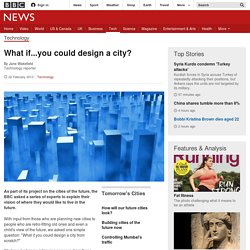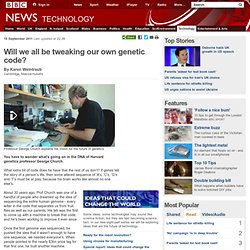

Bbcworldservice : How should the cities of the... What if...you could design a city? As part of its project on the cities of the future, the BBC asked a series of experts to explain their vision of where they would like to live in the future.

With input from those who are planning new cities to people who are retro-fitting old ones and even a child's view of the future, we asked one simple question: "What if you could design a city from scratch? " We have had some intriguing answers, from those who think the smart cities of the future will rely on technology to those who want to put people centre stage. And for the children, who will after all be the citizens of these future urban spaces, the vision is more fantastical. But then, who wouldn't want a city with tree-high swimming pools full of sweets?
Guru Banavar - IBM Guru Banavar is IBM's chief technology officer and was the chief architect behind Rio de Janeiro's control centre. A well-designed digital infrastructure will support decision-making by public managers as well as private citizens. Let me give you an example. Will we all be tweaking our own genetic code? 18 September 2011Last updated at 22:39 By Karen Weintraub Cambridge, Massachusetts Professor George Church explains his vision for the future of genetics You have to wonder what's going on in the DNA of Harvard genetics professor George Church.

What extra bit of code does he have that the rest of us don't? If genes tell the story of a person's life, then some altered sequence of 'A's, 'C's, 'G's and 'T's must be at play, because his brain works like almost no one else's. About 30 years ago, Prof Church was one of a handful of people who dreamed up the idea of sequencing the entire human genome - every letter in the code that separates us from fruit flies as well as our parents. Once the first genome was sequenced, he pushed the idea that it wasn't enough to have one sequence, we needed everyone's. Now, the cost is down to below $5,000 per genome, and Prof Church says we're quickly heading toward another 10- or 20-fold decrease in price - to roughly the cost of a blood test.
Ethical concerns. Speed-of-light experiments yield baffling result at LHC. 23 September 2011Last updated at 18:03 By Jason Palmer Science and technology reporter, BBC News Enormous underground detectors are needed to catch neutrinos, that are so elusive as to be dubbed "ghost particles" A meeting at Cern, the world's largest physics lab, has addressed results that suggest subatomic particles have gone faster than the speed of light.

The team has published its work so other scientists can determine if the approach contains any mistakes. If it does not, one of the pillars of modern science may come tumbling down. Antonio Ereditato added "words of caution" to his Cern presentation because of the "potentially great impact on physics" of the result. The speed of light is widely held to be the Universe's ultimate speed limit, and much of modern physics - as laid out in part by Albert Einstein in his theory of special relativity - depends on the idea that nothing can exceed it. "We look forward to independent measurement from other experiments. "